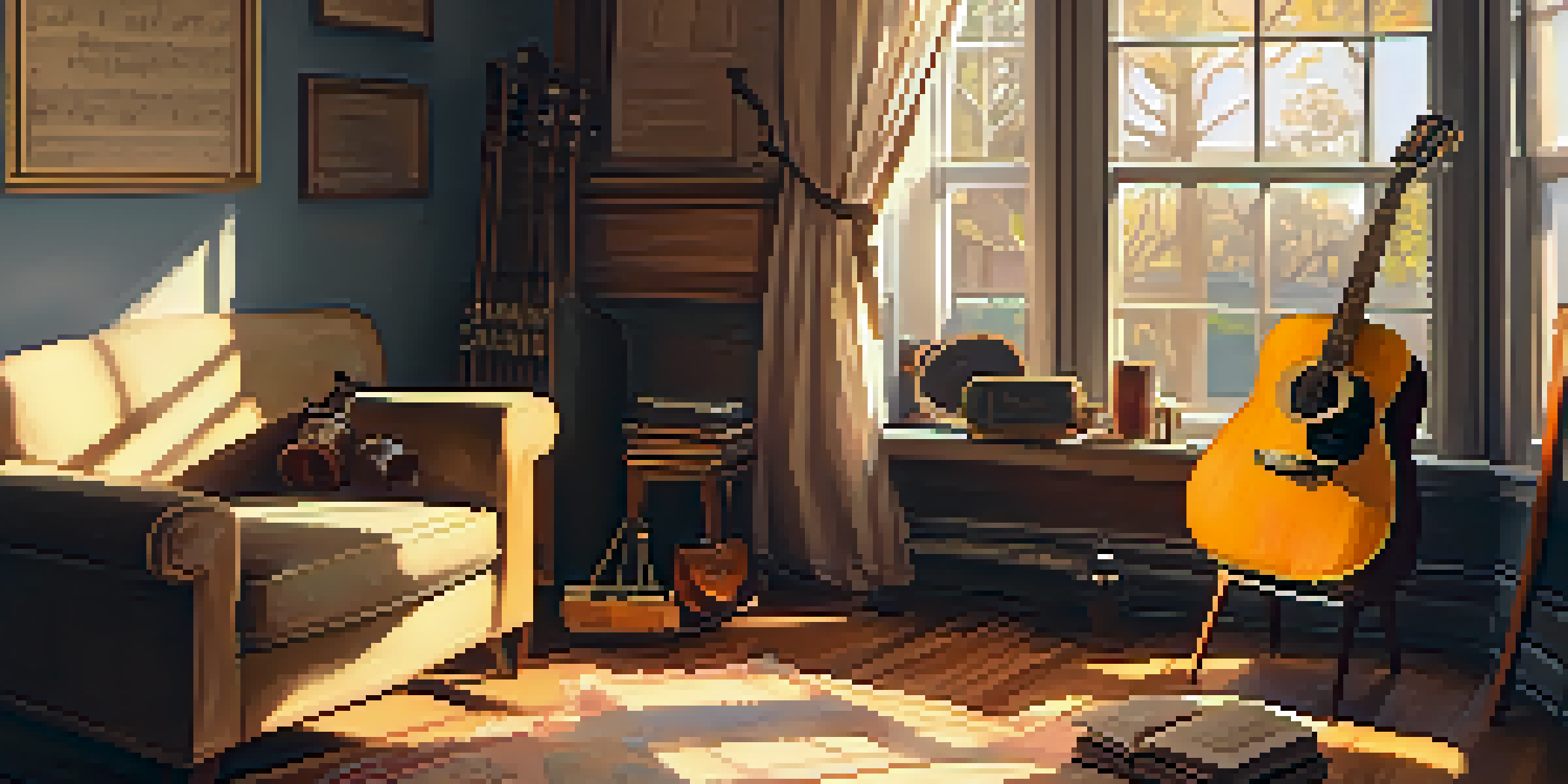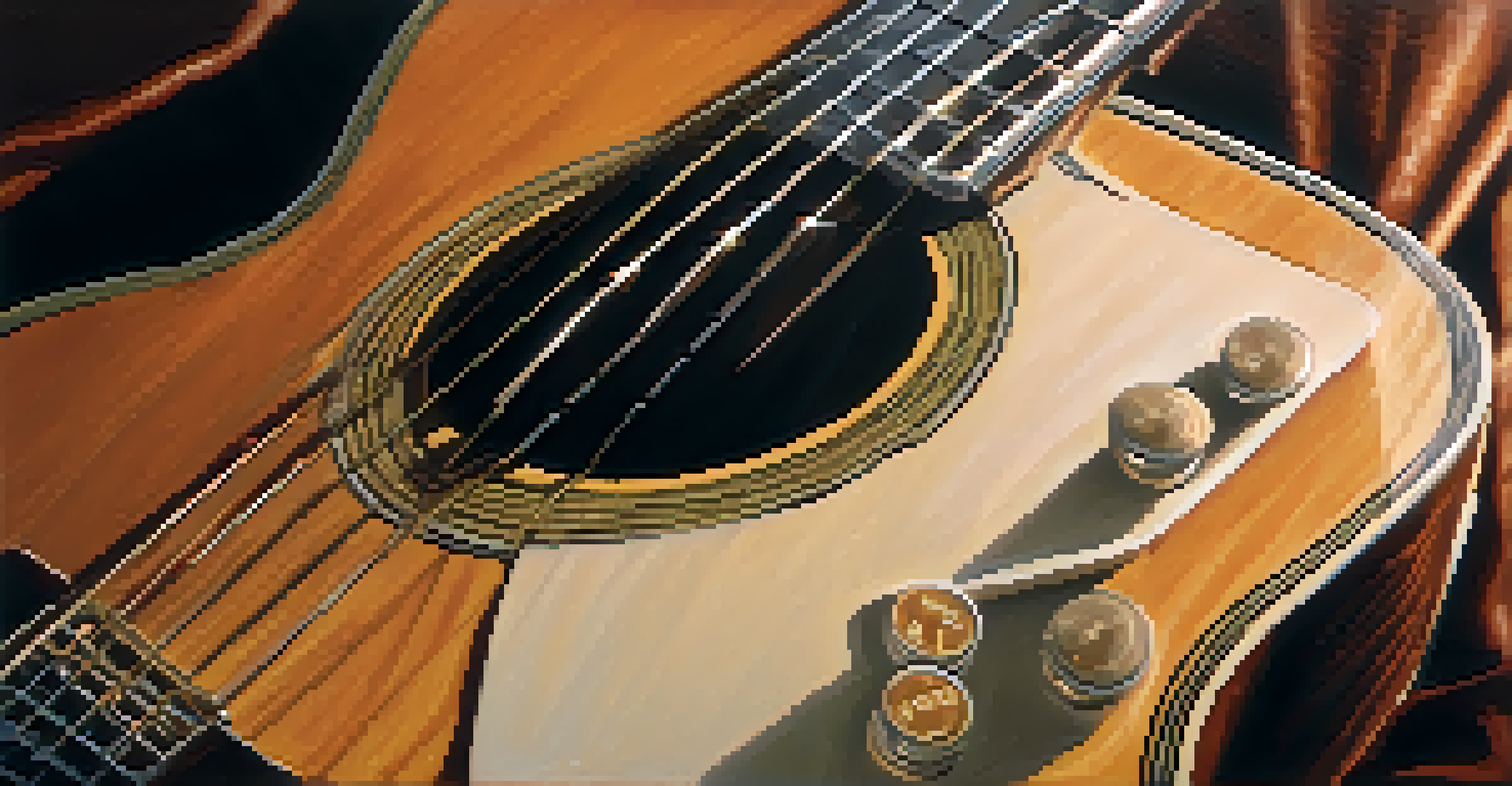Finding Your Unique Sound as a Songwriter with Guitar

Understanding What Makes Your Sound Unique
Every songwriter has a unique voice, shaped by their experiences and influences. Understanding what makes your sound distinct is the first step in your songwriting journey. Think about the artists you admire and what elements of their music resonate with you—this can provide clues about your own style.
Every artist dips their brush in their own soul, and paints their own nature into their pictures.
To uncover your unique sound, take a moment to reflect on the genres and themes that inspire you. Are you drawn to folk storytelling, rock's raw energy, or the emotional depth of blues? By identifying your preferences, you can start to carve out a niche that feels authentic to you.
Don’t be afraid to experiment with different styles and techniques. Combining various genres can lead to innovative sounds that are entirely your own. Remember, your uniqueness lies in your perspective, so embrace it as you explore.
Exploring Different Guitar Techniques
Guitar techniques can significantly influence your songwriting style. From fingerpicking to strumming patterns, each method brings a different texture to your music. Experimenting with these techniques can open up new avenues for creativity and help you discover what resonates with you.

For instance, try writing a song using a fingerstyle approach—this can create a more intimate feel. Alternatively, using a percussive strumming technique can add energy and drive to your work. By varying your approach, you can find the techniques that best express your unique sound.
Discover Your Unique Sound
Identifying your musical influences and experimenting with different styles can help you carve out a distinctive voice in songwriting.
It's also beneficial to study guitarists from different genres. Observe how they use their instrument to convey emotion and tell stories. This can inspire you to incorporate new techniques into your songwriting.
Crafting Lyrics That Reflect Your Voice
Lyrics are a powerful way to express your individuality as a songwriter. Your choice of words, themes, and storytelling methods can set you apart from others. Start by writing about personal experiences or topics that ignite your passion; authenticity often resonates more deeply with listeners.
Music can change the world because it can change people.
Consider using metaphors and vivid imagery in your lyrics. This not only enhances your storytelling but also helps to create a distinct voice. For example, instead of saying 'I’m sad', you might say 'Like a wilting flower under the summer sun,' which paints a more vivid picture.
Remember, there's no right or wrong way to write lyrics. Allow your emotions and thoughts to flow freely, and don’t shy away from vulnerability. The more personal your lyrics, the more likely they’ll connect with others.
Finding Your Preferred Song Structure
Song structure plays a crucial role in how your music is perceived. While traditional structures like verse-chorus-verse are popular, don’t feel restricted by them. Experimenting with different forms can help you find what best suits your unique sound.
For instance, you might try a through-composed structure where the music continuously evolves without repeating sections. This can create a sense of journey, keeping listeners engaged. Alternatively, a more unconventional structure might allow for greater emotional expression.
Embrace Collaboration
Working with other musicians can lead to new ideas and perspectives, enriching your songwriting process.
As you explore different structures, pay attention to how they affect the flow and mood of your song. This experimentation can lead to breakthroughs in your songwriting, helping you discover a format that feels true to your artistic voice.
Incorporating Personal Influences into Your Music
Your influences can provide a rich source of inspiration for your songwriting. Whether it's a specific artist, a book, or a life experience, these elements can shape your sound. Embrace these influences and consider how they can be woven into your music.
For example, if you’re inspired by an artist known for their storytelling, try to infuse similar narrative techniques into your own songs. This doesn’t mean copying, but rather taking inspiration and making it your own. Use these influences to guide your creative process without losing your individuality.
Sharing your influences with your audience can also create a deeper connection. Fans often appreciate understanding the roots of your sound, and it adds layers to your artistic identity.
Collaborating with Other Musicians
Collaboration can be a powerful way to discover and refine your unique sound. Working with other musicians exposes you to different perspectives and techniques. Plus, it can ignite fresh ideas that you might not have considered on your own.
Consider joining local music groups or online songwriting communities. Even informal jam sessions can lead to unexpected breakthroughs in your songwriting. You might find that a simple chord change or lyrical twist from a collaborator opens up new possibilities for your music.
Practice for Growth
Consistent songwriting practice is essential for refining your craft and evolving your unique sound.
Remember, collaboration doesn’t mean losing your identity. Instead, it’s an opportunity to blend your voice with others, creating something unique and innovative. Embrace the process and see where it leads you.
Practicing Consistently to Hone Your Craft
Like any skill, songwriting requires consistent practice to refine your sound. Set aside time each week to write, play, and experiment with your guitar. This regular engagement helps you develop your voice and keeps your creativity flowing.
Don’t be discouraged if you hit a creative block; it happens to everyone. Sometimes, stepping away for a bit can provide clarity and new insights. Other times, simply writing through the block can lead to unexpected breakthroughs.

Also, consider keeping a journal of ideas, lyrics, or melodies that come to you during the day. This can serve as a valuable resource for future songwriting sessions, ensuring that your unique sound continues to evolve and grow.